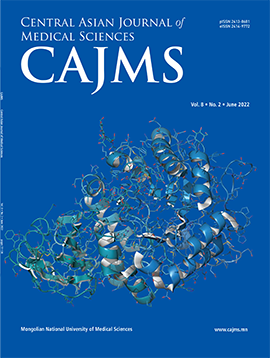Mental Health Problems of the People in Isolation Related to SARS-CoV-2 Virus Infection
DOI:
https://doi.org/10.24079/cajms.2021.12.007Keywords:
Citizen-Isolators, Depression, Anxiety, Severe Stress, COVID-19Abstract
Objectives: To define the mental health status of people in isolation, and determined the correlation between mental health variables of the respondents. Methods: The study design was descriptive cross-actional. Isolated citizens, who were transported by charter flight from different foreign countries to Mongolia from July 1, 2020, to September 1, 2020, and observed by epidemiological reference in the isolation places. Results: The majority (38.8%, n = 157) of the 405 total cases aged 17- 97 year-olds, were 25- 34 year-olds and the average age was 34.2 ± 14.6. Majority of respondents (n = 213; 52.6%) were male. When mental health variables were compared with age groups, depression, anxiety, and self-stigma were not statistically significant for age group. However, in any age group of participants, self-stigma was moderately more at 91.8% (p = 0.043), and self-stigma at 93.8% was moderate. 38.1% of the total isolated population had mild to severe depression, and 30.4% had mild to moderate anxiety. Conclusion: Respondents who were impacted by strong stressors were more likely to experience depression and anxiety than respondents who were not impacted, and increased levels of depression were caused by strong stressors and anxiety. A moderate level of self-stigma is more present in any age group.
Downloads
255
Downloads
Published
How to Cite
Issue
Section
License
Copyright (c) 2021 Mongolian National University of Medical Sciences

This work is licensed under a Creative Commons Attribution-NonCommercial 4.0 International License.




